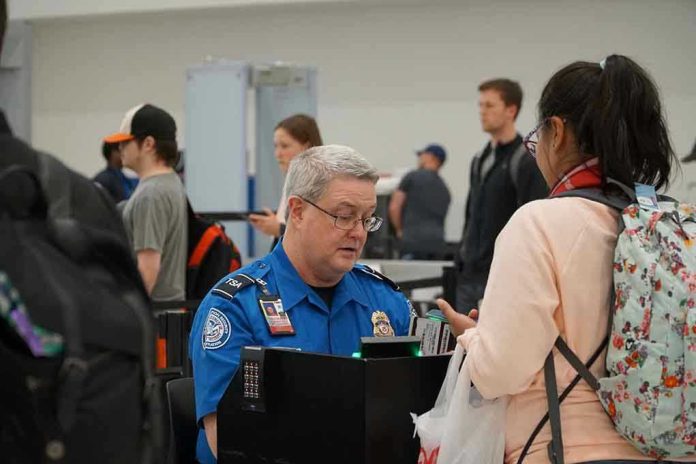
What does it take for a government to recognize the invisible backbone of airport security—especially when that backbone worked without pay through a national shutdown? Kristi Noem’s answer was a $10,000 check, but only for those who truly stood out.
Quick Take
- Homeland Security Secretary Kristi Noem announced $10,000 bonuses for select TSA officers after the 2025 government shutdown.
- Bonuses target those who delivered “exemplary service” while working without regular paychecks.
- Recognition is both financial and public, with direct check presentations in a high-profile setting.
- The move redefines how federal workers are valued—and who gets rewarded—during crises.
Recognition for the Unseen: Noem’s $10,000 TSA Bonus Announcement
November 13, 2025: Houston’s airport buzzed with more than the usual pre-flight anticipation as Secretary Kristi Noem strode to the podium. She didn’t mince words. TSA officers who kept security lines moving during the shutdown—without knowing when their next paycheck would land—would now receive $10,000 bonuses. But here’s the catch: not everyone got one. The bonus was reserved for those who, by Noem’s measure, went “above and beyond.” Suddenly, the story wasn’t just about compensation; it was about selective recognition and the values driving it.
Noem’s remarks underscored the trials of working—often unseen—while the rest of the federal government stood still. She made it a point to highlight officers who “took on extra shifts, showed up each and every day, served the American people,” and kept the country’s vital infrastructure humming. The presentation wasn’t just a ceremonial gesture. It was a pointed message: in the era of fiscal gridlock, excellence would not only be expected but publicly and materially rewarded.
Patriotism, Paychecks, and Precedent: A New Approach to Shutdown Compensation
Historically, government shutdowns have been brutal for essential personnel. Classified as too critical to stay home, TSA officers and others kept working, often while their bank accounts dwindled. Previous administrations restored back pay, but rarely did they single out exemplary performers with big bonuses. Noem’s initiative signals a departure—a move toward competitive recognition, rather than blanket compensation for all.
This approach, however, raises questions that ripple far beyond TSA checkpoints. By publicly rewarding only a select group, the Department of Homeland Security is betting on the motivational power of merit-based rewards. Yet, it also risks dividing a workforce that weathered the same storm, albeit with varying degrees of visibility and effort. The explicit criteria for “exemplary service” remain vague, leaving room for debate—and perhaps, future discontent.
The Power Dynamics and Political Calculus of Recognition
Noem’s authority as Homeland Security Secretary gave her the power to redirect departmental funds for these bonuses. The optics of the announcement—live checks, handshakes, and media coverage—were crafted to showcase decisive leadership. But behind the headlines, the move reflects the push-and-pull between executive authority and Congressional purse strings. Congress controls appropriations, but department heads like Noem wield influence over how, and whom, to reward in the aftermath of a shutdown.
For the TSA workforce, the bonus may offer immediate relief for those selected, but it also sets a precedent. Will future shutdowns see similar targeted rewards? Could this approach expand across other federal sectors with essential personnel? These open questions will shape not only employee morale but also future negotiations between labor and leadership. For the traveling public, the outcome was seamless security during the shutdown—a feat now celebrated, but at a cost that remains to be fully tallied.
Impact, Unanswered Questions, and the Road Ahead
The $10,000 bonus program’s short-term effect is clear: immediate financial relief and a reputational boost for Homeland Security. Long-term, the implications are murkier. Selective recognition could drive higher performance—or breed resentment among those who felt overlooked. The total cost, the precise criteria for selection, and the timeline for implementation all remain unclear, as does how this fits into the broader debate about compensating essential workers in times of crisis.
As the story unfolds, the TSA bonus program will serve as a test case for how America values—and incentivizes—public service under stress. Will selective bonuses become the new standard, or will the backlash prompt a return to universal compensation? For now, Noem’s $10,000 checks signal both gratitude and a challenge: show up, stand out, and you might just be rewarded next time the government grinds to a halt.
Sources:
DHS announces $10K shutdown bonuses for some TSA officers












